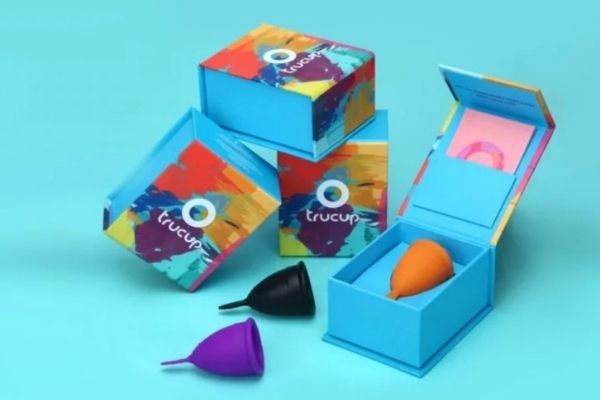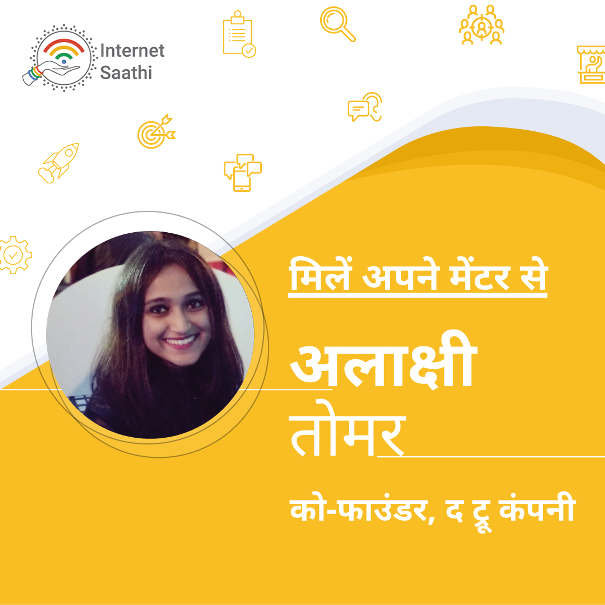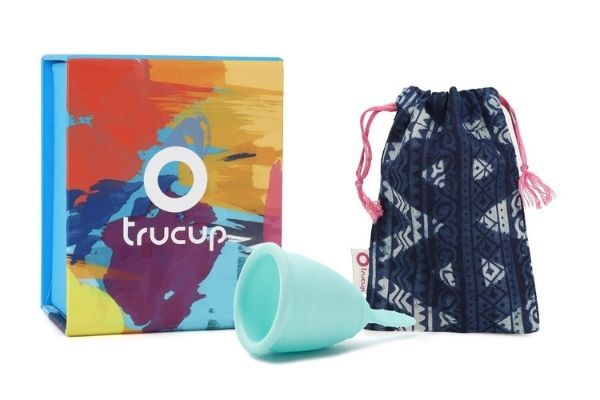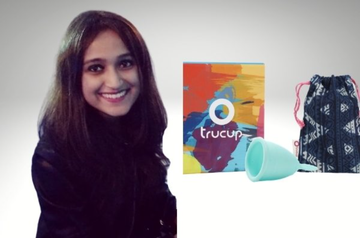How Alakshi Tomar Is Championing Sustainable Menstruation
Alakshi Tomar is an entrepreneur who champions sustainable menstruation and sustainable menstrual products to create inclusion and opportunities for women.
Alakshi Tomar is the Co-founder of The Tru Company, promoting positive and sustainable menstruation, with the objective of inclusion.
Working closely at the intersection of gender, education, sexual and reproductive health, she is a certified trainer, impacting menstruating women to break taboos surrounding menstruation across India and Singapore.
Alakshi has previously worked on building capabilities and hiring talent with Accenture. A crossover from the private sector, she shifted to leadership development in government schools and worked closely with Mumbai slum communities as a Gandhi Fellow, to improve learning and health outcomes.
Passionate about sustainable solutions, the Tru Company was established to scale sustainable menstruation products like TruCup menstrual cup - a sustainable menstrual cup for women - and provide educational programs across South Asia.
Today, Alakshi is helping young women reclaim their place in the world by giving them access to safe, hygienic, and eco-friendly menstrual products.
Tell us a little about your background and personal growth journey - where you grew up, studied.
While I was born in Shimla, due to my father’s job, we moved from there when I was 2 years old. Growing up in Kathmandu and majorly Jaipur, I grew up as a quiet and shy child!
No-one really thought I could be independent. Reading and writing were my educators, and I was never the one who could pick up a fight, shout at someone, be too assertive.
While I learnt how to hide my tears, my confidence took a plummeting. Our culture rewards the extroverts, our education system, the way success is defined, favours extroverts. An introvert has to struggle harder to make themselves heard.
However, my family always pushed me to step outside my comfort zone and take my own decisions - be it participating in school events or shifting to another city for college.
Plus the books I read were always a source of inspiration for me, from fantasy fiction to real stories of inspirational people. With such a keen impact and attachment towards books and my love for writing, I decided to study English literature in college.
That really opened up my horizons, as I improved my verbal communication, developed opinions and understood critical analysis of people and situations. Literature taught me to read between the lines, even in real life!
Tell us a little about your career and business journey and what excited you most about it?
My professional journey started as with most young freshers- without much thought, going where life takes you.
After completing my bachelors in English literature from Delhi University, I figured since I don’t want to get into media and I was good with people, I should apply for an HR role at Accenture.
And so I joined the corporate rat race and though I built critical skills of people management and communication, I failed to enjoy work.
I looked for meaning outside of it, and while I was writing on feminism and training people with disabilities, I discovered my passion - tapping into the enormous potential of people, specifically who had so many disadvantages stacked against them.
I decided to quit my job and join the Gandhi Fellowship, a two-year residential program, where I worked with government school teachers and headmasters and slum communities to improve learning levels of children.
At the Gandhi Fellowship however, I failed again. Simple parent-teacher discussions on corporal punishment led to unruly fights, efforts to set up health camps failed miserably.
During the fellowship, as part of the process, we had to live in the Mumbai slum community for 3 months, where I saw the rampant marginalization of women. When mobility and freedom is taken away, achieving any goal becomes extremely tough.
I discovered an implausible challenge - menstruating girls missing school repeatedly. Facing outright discrimination, infrastructural and mobility challenges, girls were also told not talk to elders or take a bath during their period.
I dug deeper, mobilised a team of peers and collaborated with local politicians to set up a low-cost sanitary napkin manufacturing unit, with a few women running it.
For project sustainability, we wanted to build their capability to run the unit themselves but we failed. The women were restricted by their families, the community leaders, but also by their own confidence and conditioning.
I realised the essence of designing for the stakeholder, for the customer. If you create a solution without visualising how it would benefit the end-consumer, or how it addresses their pain points, it is a recipe for disaster.
With the pad unit we wanted to set up, it didn’t solve the problem completely, of societal restrictions - a major design flaw, which is also very important to realise. Each of these failures taught me resilience, agility and commitment to impact.
Since then, I wanted to solve the issue of menstruation and women livelihood on a long-term basis but after the fellowship, I decided to understand the social sector from a macro perspective and joined the strategy team of Piramal Foundation for education leadership.
My major learning there was about structure - as we designed education strategies, I realised that creativity is not abstract. With structure you can express your creativity better.
Each of these experiences helped me launch Trucup. In 2017, as I switched to menstrual cups and my period experience was transformed. Sometime after that, as my co-founder, Shivangi, shared the idea of creating a new cup and it was like a light-bulb switched on.
The cup solved all problems I had identified - accessible, safe menstrual product, affordable as it lasted for 8 years, ensured mobility during periods, taboo-shattering - the panacea for all menstrual problems!
Diving into setting up TruCup, I KNEW that menstrual cups will transform lives of menstruating women - a step towards equity. We also train women on menstruation, sexual and reproductive health, gender politics, eco-friendliness.
We are creating a category, receiving traction, positive reviews and transformational stories. I have trained and “Cup-verted” menstruators from multiple countries, all the while learning how to do company taxes! But moving from an corporate to social to entrepreneur, I had a lot of help on the way.

Did you personally have a mentor yourself and how did this experience benefit you?
Early in life, my guidance came from my parents and sister, towards not being scared and following what makes me happy. Another big influence in my life has been my previous manager, Aditya Natraj, who opened up an entire new way of how I work or approach life.
I learnt to work extremely hard, always think, problem solve, structure and build sustainable solutions. His probing questions helped me understand my choices, stay true to my mission, value system and be more ambitious with my goals.
What are some of the unique initiatives driven by you?
I am currently working with an incubator, a startup studio called build3, wherein we build sustainable social startups creatively, conscientiously and through the power of communities.
By providing a founding team, access to collective wisdom, systems and tools to launch dreams mindfully, our objective is to build value aligned startups by acting like a Sherpa on their journey towards solving problems sustainably.
SHEROES is the largest women-only social network in the world. What role do you see it playing in the women’s internet narrative?
The power of access and community is manifold - helping grow the self and society. While it can help provide a platform for exploring the potential of women by giving these opportunities, I also feel it creates a safe space to express and explore.
How does it feel to be a pioneer in someone’s success? What has been your experience so far?
While the experience has been full of challenges, I still feel very hopeful and motivated when I think of the potential of the women I am working with.
They have passion, ideas and a drive to do something, but are often hindered by things I mostly took for granted - family support, access to knowledge and technology, freedom and mobility, funding support etc.
In spite of this, they still want to push forward, understand the ideas we are sharing and try things on their own.
What are some of the unique challenges faced by the Saathis you’re mentoring? Was there anything specifically that took you by surprise?
I did not anticipate the extremity of logistical challenges faced by my Saathis - no access to personal phones, family members checking messages, asking them not to indulge in social media.
They are also very hesitant to switch on their cameras, a problem we are still trying to explore the reason for. While attendance varied, there are 4 to 5 Saathis who have persevered since the beginning and we’re beginning to identify ways to support them and push their business forward.
I was surprised by their dexterity with the phone already - a lot of the things we shared in the beginning, they were quite familiar with it, from Facebook to internet banking etc. The challenge here was their independent use of it and leveraging it for business.

What inspired you to become a mentor for the Internet Saathi programme?
I am a strong believer in the power of women, and over the years have built an understanding of the kind of restrictions and societal pressures that cut them off from exploring their full potential.
I have personally experienced the direct and indirect injustices of living in a patriarchal society and have been able to overcome my own inhibitions!
I wanted to start a dialogue - to learn from the Saathis, while sharing my own experiences and some learnings from my personal and professional life.
This is the first online accelerator for rural micro-entrepreneurs. Are there any unique experiments you have tried to get them excited about leveraging digital tools?
We interact with creating customised presentations based on the topic - my buddy also supports me within this. We also try to connect them to other people and mentors that can help them solve specific business or personal issues.
My main goal always is to identify their problem, create a fear free environment so that they trust us and share openly - rather than just offering tools and solutions.
We do a lot of unstructured conversation, show videos and we did a very interesting visioning exercise to think of the future.
You try to live plastic-free. What inspired you to make that decision? Can you share some tips and hacks that others can use to start their own journey to sustainable living?
It was a gradual decision to live life sustainably as I saw the deep impact of living in excess - on the world and our personal peace. No one is happy buying more and more, since there's no intrinsic value to money or things.
The value is created by how it brings you happiness and peace. And there can be so many other things that do the same, without harming our bodies or the environment.
I had watched a lot of documentaries around the impact of waste creation but what really moved me was my experience while working in Mumbai slums.
I worked with a school which was near a dumping ground and while visiting a child’s house in the middle of that dumping ground, the reality of the situation blew me over.
There were people who were living among the waste we threw out, and that doesn’t go anywhere. It stays, just hidden from view, still polluting and deteriorating life.
My simple tip is to start small with small habits, such as switching to the menstrual cup (:D), always carrying a cloth bag while grocery shopping, not compulsively buying without need, being mindful of what you eat and drink, being conscious of the products we use.
I also feel a lot of people think - how can refusing one plastic straw help the giant problem of waste generation and climate change? We need to move away from this thought process, since it is individual action that will lead to societal change.

How do you motivate women to move towards sustainable menstruation and choose environmentally-friendly menstrual products?
I have a very honest conversation with them about their bodies, about the products they use, the harm those products can do on the body and environment, their questions around periods.
I have realised that menstruating women never get a chance to openly discuss their periods or the problems associated with them, so I give them an opportunity to talk and mostly just listen.
The benefits of sustainable menstruation speak for itself - making life easy, economical, eco-friendly! :)
Do you use sustainable period products and eco-friendly menstrual products such as the sustainable menstrual cup? Do share your experience in the comments below.
















